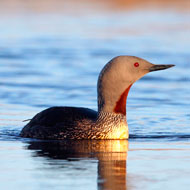Stopping the decline of native wildlife

Naturalists, politicians and businesses can make a big difference to the decline of native wildlife.
Halting the decline of native species was the focus of the Conference for Nature held in Westminster yesterday, Wednesday 3 September, with delegates including Sir David Attenborough and deputy Prime Minister Nick Clegg discussing measures to deal with the crisis facing wildlife in the UK.
The naturalist and politician were joined by Germaine Greer and more than 250 key people from business, government, the utility sector and conservation for the event organised by the State of Nature Partnership, a coalition of twenty-six leading UK charities and groups, including RSPB, The Wildlife Trusts, Buglife, Butterfly Conservation and Plantlife.
In May 2013 the partnership released the State of Nature report which revealed 60 per cent of native species are in decline and one in ten are heading for UK extinction.
Ahead of the event Sir David Attenborough said; “From the food we eat to the popular bedtime stories we read to our children, nature touches everyone’s lives more deeply than we can possibly imagine. The escalating erosion of wildlife from our planet is a direct threat to many facets of our own quality of life. Because of the complex relationship society has with nature, it is obvious that our response to saving it must extend from every possible quarter too. From you and I in our own domains, from business magnates to politicians, and from farmers to faith leaders, everyone has an opportunity to save nature. With an increasing global footprint, mankind is intensifying the crisis for wildlife, but as individuals we can all be a part of the solution for saving it too.”
Mike Clarke, the RSPB’s Chief Executive, said: “Last year’s State of Nature Conference set out the context for the devastating declines in some of our best-loved species, such as the turtle dove, common toad, and Atlantic salmon. However, saving these and other threatened species requires inventive solutions and creative partnerships with many sectors, underpinned by a meaningful commitment from Government. This conference is the platform for all to come together and achieve just that.”
Helen Ghosh, Director-General of the National Trust, said: “The evidence that nature is in trouble is overwhelming. Our challenge is to find radical and practical solutions to restore the health of our natural environment, which we know is loved by people across the UK. At the heart of this approach must be collaboration and partnership – working together to think big, be bold and to deliver real change on the ground.”
Speaking at the conference Sir David cited 'great new challenges' but said three groups had the power to make a difference.
"Naturalists - who can tell you what’s happening, who understand the new species and their requirements; politicians – who can help ensure legislation goes through, and business executives, in a myriad ways help and make sure businesses take account of what goes on around them and ensure products are in sympathy with the demands of the natural world.
“What is heartening about the community here now – between you, you have the power to deal with it. There are conservationists among you with the expertise but there are also executives and politicians – people who take decisions which really affect wildlife.”



 The Veterinary Medicines Directorate (VMD) is inviting applications from veterinary students to attend a one-week extramural studies (EMS) placement in July 2026.
The Veterinary Medicines Directorate (VMD) is inviting applications from veterinary students to attend a one-week extramural studies (EMS) placement in July 2026.